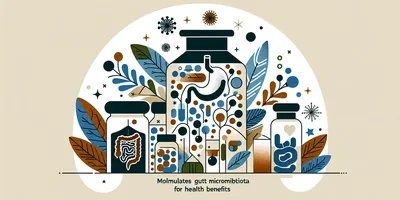Leafy Brain Benefits (Tremella foliacea)
Leafy Brain (Tremella foliacea) is an edible mushroom and medicinal mushroom.

Supports Healthy Cholesterol Levels
The Leafy Brain mushroom has been recognized for its remarkable hypolipidemic effects, which contribute to maintaining healthy cholesterol levels. This is particularly significant in the context of cardiovascular health, as managing cholesterol is crucial for preventing heart disease.
Through the isolation and analysis of its polysaccharides, research has discovered that Leafy Brain can effectively reduce bad cholesterol levels while simultaneously increasing good cholesterol. These bioactive compounds interact with the body’s metabolic processes to promote a balanced lipid profile.
Further exploration into the mushroom's polysaccharides reveals that they possess the capacity to not only regulate lipids but also to offer immunostimulatory, antitumor, anti-diabetic, and hepatoprotective benefits. These multifaceted effects underscore the potential of Leafy Brain as a functional food or ingredient in pharmaceutical applications to combat various health issues associated with high cholesterol.
Learn about mushrooms with Hypolipidemic benefits.

Antitumor Benefits
Leafy Brain mushroom is not only a culinary delight but also bears significant antitumor properties. Its rich polysaccharide content has been shown to play a crucial role in combating various forms of cancer. A comprehensive review of polysaccharides from the mushroom highlights the potential in this field, showcasing the antitumor activity alongside other health benefits.
These polysaccharides possess immunostimulatory functions that are vital for preventive health strategies. By strengthening the immune system, Leafy Brain's polysaccharides potentially augment the body's natural defense against tumor cells. Moreover, the structural complexity of these carbohydrates is under extensive study, for their direct antitumor effects could open new avenues for cancer therapy.
The review emphasizes the need for more detailed research into the relationship between the structure and activity of these polysaccharides. Through such insights, the antitumor effectiveness of Leafy Brain could be optimized, possibly leading to standardized production techniques for both the functional food industry and pharmaceutical applications. This promising data underscores the critical importance of mushrooms like the Leafy Brain in the ongoing search for natural antitumor solutions.
Learn about mushrooms with antitumor benefits.

Hepatoprotective Effects
Leafy Brain is not just a culinary delight but also a beacon of health benefits, particularly when it comes to liver health. It is rich in polysaccharides that have shown hepatoprotective activities, offering a shield for the liver against various injurious substances.
These polysaccharides have been rigorously scrutinized through modern studies, which highlight their potential in fighting chronic ailments that may affect the liver, such as inflammatory diseases. The efficient extraction and purification of these polysaccharides have led to a better understanding of their structural features and, consequently, their medicinal properties.
The liver-protecting benefit of Leafy Brain's polysaccharides is backed by various research methodologies including IR, UV, GC-MS, NMR, and HPLC. This comprehensive analysis ensures that the hepatoprotective properties of Leafy Brain are well-documented and could be harnessed in both functional foods and the pharmaceutical industry.
Given the critical role the liver plays in detoxification and metabolism, the importance of these findings cannot be overstated. The advancement of chemical modifications like acetylation and sulfation is further explored to amplify the biological activities of these polysaccharides, offering hope for enhanced liver protection in various health applications.
Learn about mushrooms with hepatoprotective benefits.

Enhances Immune System Function
The Leafy Brain mushroom is celebrated for its rich polysaccharide content, which has shown promising results in stimulating the immune system. Researchers have revealed that these polysaccharides possess a wide range of immunostimulatory benefits, which may contribute significantly to preventing and battling against chronic diseases.
These bioactive compounds from Leafy Brain are the focus of extensive studies regarding their capacity to fight chronic inflammatory conditions, neoplastic diseases, and metabolic disorders such as diabetes. The efficacy of different extraction methods like hot water and ultrasonic-assisted processes is assessed to optimize the yield of these health-promoting substances. Advanced analytical techniques, including IR, UV, GC-MS, NMR, and HPLC, are utilized in the structural characterization to ensure a detailed understanding of the relationship between their chemical nature and biological activities.
The proven immunostimulatory activities of Leafy Brain's polysaccharides include the enhancement of innate and adaptive immunity, marked by an increase in phagocytic activity and the proliferation of lymphocytes. These findings open new avenues for the mushroom’s inclusion in functional foods and pharmaceutical applications, and underscore the necessity for continued research into the precise mechanisms by which these polysaccharides reinforce the immune system.
Additionally, the possibility of chemically modifying these polysaccharides, such as through acetylation and sulfation, holds promise for augmenting their biological activity. As such, the Leafy Brain mushroom emerges as a potent natural resource with a potential role in the future of health and medicinal industries.
Learn about mushrooms with immunostimulatory benefits.

Supports Blood Sugar Management
The consumption of Leafy Brain mushroom has shown potential benefits for individuals managing diabetes. Polysaccharides found in the mushroom are being recognized for their anti-diabetic properties, which may help in regulating blood sugar levels.
These bioactive compounds in Leafy Brain have been the subject of research due to their potential to mitigate chronic conditions such as diabetes. The study delves into how the structure of these polysaccharides can influence their therapeutic efficacy, emphasizing the need for more detailed exploration into their role in blood sugar management.
The findings of the research suggest that the mushroom's polysaccharides may work by moderating immune responses and inflammatory processes that are often associated with the development and progression of diabetes. As an adjunct to traditional treatment methods, Leafy Brain could be a promising addition to a diabetic's dietary regimen, promoting better control over the disease.
Given the complexity of diabetes as a medical condition, the review encapsulates the significance of continued research into the use of Leafy Brain polysaccharides. Such studies are vital for validating the mushroom's efficacy and paving the way for its use in functional foods or pharmaceuticals, offering an innovative approach to diabetes management.
Learn about mushrooms with anti-diabetic benefits.

Supports Respiratory Health
The Leafy Brain's rich polysaccharide content has been identified to hold anti-asthmatic properties that support respiratory health. These naturally occurring compounds have shown potential in combating chronic inflammatory diseases such as asthma, which is characterized by inflammation and narrowing of the airways.
Through their immunomodulatory effects, the polysaccharides from the Leafy Brain mushroom are thought to help in reducing airway inflammation, which is a key aspect of asthma management. The anti-inflammatory properties may aid in soothing the respiratory tract, leading to reduced symptoms and improved breathing in individuals with asthma.
Further research and exploration into the structural features and bioactivities of these polysaccharides could pave the way for new therapeutic approaches in the functional food and pharmaceutical industries to aid those suffering from respiratory conditions.
Learn about mushrooms with anti-asthmatic benefits.

Protects Colon Health
Leafy Brain has shown promise in protecting against colon inflammation, which is crucial for maintaining overall digestive health. In a compelling study, polysaccharides from the mushroom demonstrated their ability to reduce damaging inflammatory responses in the colon.
The research highlighted how consumption of Leafy Brain polysaccharides prevented colon shortening, a common symptom of colitis, and repaired tissue damage in the digestive system. Additionally, these polysaccharides were found to have a profound effect on gut health by stimulating regulatory T cells and balancing key cytokines, which are essential for the immune system to respond appropriately to inflammation.
Moreover, this mushroom influenced the gut microbiota composition, promoting a greater diversity of beneficial bacteria, and modulated bacterial metabolite production. This change in the gut environment plays a pivotal role in pathways including tyrosine, tryptophan, and bile acid metabolism, all of which are critical for maintaining the integrity and function of the colon. With its potential as a natural supplement, Leafy Brain might soon become an integral part of dietary strategies designed to support colon health and prevent intestinal diseases.
Learn about mushrooms with Protects colon benefits.

Reduces Inflammation
The Leafy Brain mushroom has been identified as a natural agent in combatting inflammation. In a pivotal study on colitis, a form of inflammatory bowel disease, Tremella fuciformis polysaccharides were found to have significant anti-inflammatory effects.
These polysaccharides prevented the shortening of the colon, a common symptom of colitis, and reduced the activity of inflammatory enzymes in the colonic tissue. Remarkably, the protective properties of Leafy Brain extended to repairing tissue damage in mice with colitis. The mechanism behind this involves the stimulation of regulatory T cells—specifically, Foxp3+ T cells—that are crucial for maintaining immune tolerance and suppressing excessive inflammatory responses.
Moreover, the study highlighted that consuming Leafy Brain mushroom could lead to a healthier gut microbiota, increasing its diversity and restoring beneficial bacterial families that are often compromised during inflammation. Through the influence on gut microbiota, this mushroom also affected crucial metabolic pathways related to amino acids and bile acids, suggesting a holistic approach to inflammation reduction.
This research underlines the therapeutic potential of Leafy Brain, not just as a dietary addition but also as an influential food supplement that could help in the management of intestinal diseases through its immunoregulatory properties and its ability to restore balance in gut microbiota and microbial metabolites.
Learn about mushrooms with Reduces inflammation benefits.

Modulates Gut Microbiota
The Leafy Brain mushroom displays remarkable properties in promoting gastrointestinal health, particularly by influencing the gut microbiota. Research has shown that polysaccharides found in Leafy Brain can actively prevent and repair colon inflammation by interacting with the body’s immune cells and the gut’s bacterial population.
In a study, subjects with colitis induced by dextran sulfate sodium showed a significant improvement when treated with these polysaccharides. The mushroom's components not only prevented colon shortening—a marker of inflammation and damage—but also reduced the activity of harmful enzymes in the colon. Furthermore, an increase in regulatory T cells, known for their anti-inflammatory effects, was observed, indicating a strong immunoregulatory effect.
What’s particularly striking is the mushroom’s ability to alter the gut microbiota composition, enhancing the diversity and promoting the proliferation of beneficial bacterial families. This pivotal shift in the microbiome is linked to improvements in crucial metabolic pathways related to tyrosine, tryptophan, and bile acid metabolism. Consequently, these findings suggest that incorporating Leafy Brain into one's diet could support the restoration of a healthy gut ecosystem and metabolic harmony, thereby holding potential as a dietary adjunct for intestinal health management.
Learn about mushrooms with Modulates gut microbiota benefits.